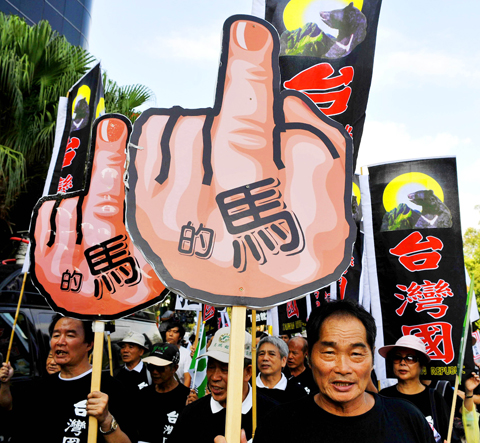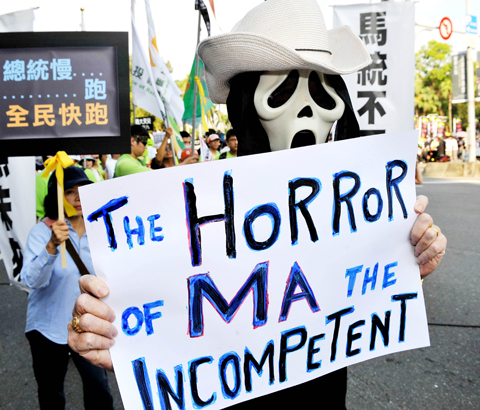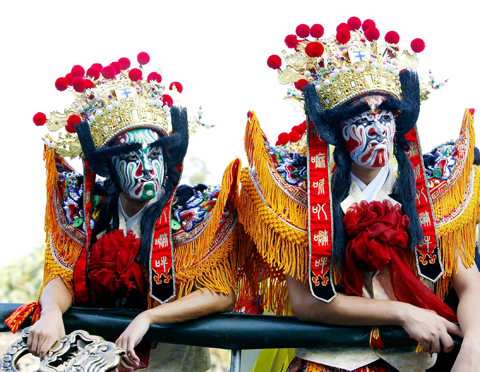Around 1,000 people joined a “pajama parade” yesterday — though only a handful of people actually wore pajamas — organized by artists unhappy with President Ma Ying-jeou’s (馬英九) leadership, calling on him to step down or to stop getting paid.
Following banners that read “stop paying the incompetent” and a woman dressed up as a Chinese zombie to portray Ma’s administration as a “zombie government,” demonstrators departed from the assembly point in front of the National Taiwan University and headed toward Ketagalan Boulevard in front of the Presidential Office, before moving on to Liberty Square for a rally in the evening.
Many brought along homemade placards voicing their discontent at the government, with slogans such as “Ma is the biggest disaster” and “the president is jogging, it’s time to start running,” alluding to Ma’s signature sport. Even with a busy schedule as president, Ma still manages to find time to take part in many running events.

PHOTO: SAM YEH, AFP
“We wanted to make this a ‘pajama parade’ because our government is always asleep, and with such an incapable government, the people may need to be prepared to escape from disaster in their pajamas at anytime,” said Koma Chen (陳佳汝), one of the event’s organizers and a theater artist.
As most of the organizers are artists, they decided to make the parade a little different from most other political demonstrations.
“We hope to turn the demonstration itself into action art, as well as a festival,” she said.

PHOTO: SAM YEH, AFP
Besides the organizers, however, only a few people actually wore their pajamas to the march.
Among the demonstrators were bajiajiang (八家將) performers. Traditional belief has it that the bajiajiang are eight generals who remove all evil spirits from a road before deities are to travel along them.
In most Taoist parades of deities on religious holidays, there are usually people dressed as bajiajiang marching and performing ahead of the deity statues.

PHOTO: NICKY LOH, REUTERS
The presence of the bajiajiang in the parade was thus to clear away evil spirits and misfortune for Taiwan, the organizers said.
Founder of the Taiwan Republic Campaign Peter Wang (王獻極) painted himself black and carried large rocks made of polystyrene foam, walking barefoot among the demonstrators.
“This is a representation of typhoon victims who, with mud all over their bodies, have lost everything, including their shoes, but have been forgotten by the government,” he said. “The rocks represent the ‘mudslide of anger’ from the devastated areas that is now heading toward the Presidential Office.”
Wang was referring to the devastation wrought by Typhoon Morakot, which hit the country on the weekend of Aug. 7 and took more than 700 lives in severe mudslides and flooding.
While the parade proceeded peacefully, with passers-by and motorists responding positively to the marchers for the most part, an elderly woman living in a high-rise apartment building along the parade route was upset by the demonstration, and threw water over the demonstrators from her fifth-story window.
Protesters responded with louder cries of “Ma Ying-jeou, step down.”
No further exchanges occurred between the woman and the demonstrators.
The artists performed a skit re-enacting scenes of people suffering and dying as the storm hit, implying that the government did not lend a helping hand fast enough.
“I want to tell the residents of Taipei — who are usually silent on political events — that if you think you can still believe in this government and wait for them to solve all of our problems, you’re putting your children’s future at stake,” one of the artists, Hsia Lin (夏林), said.
Later on, several independent bands and solo artists performed at a rally in Liberty Square.
Musician Chu Yueh-hsin (朱約信), better known as Joy Topper (豬頭皮), opened the event, performing songs in his own unique style — half singing and half talking lyrics that are half pre-written and half improvised on the spot, blending criticism of current events and politicians.
“Coming here is a way to show that I love and care for my country,” said Ann Chiu (邱薇潔), a 26-year-old woman in the audience.
Chiu said that although she was never a supporter of Ma, she had been hopeful that he would do something good for Taiwan and act efficiently, since the Chinese Nationalist Party (KMT) holds an absolute majority in the legislature.
“I’m totally disappointed,” she said. “Ma is doing a worse job than I expected.”

INVESTIGATION: The case is the latest instance of a DPP figure being implicated in an espionage network accused of allegedly leaking information to Chinese intelligence Democratic Progressive Party (DPP) member Ho Jen-chieh (何仁傑) was detained and held incommunicado yesterday on suspicion of spying for China during his tenure as assistant to then-minister of foreign affairs Joseph Wu (吳釗燮). The Taipei District Prosecutors’ Office said Ho was implicated during its investigation into alleged spying activities by former Presidential Office consultant Wu Shang-yu (吳尚雨). Prosecutors said there is reason to believe Ho breached the National Security Act (國家安全法) by leaking classified Ministry of Foreign Affairs information to Chinese intelligence. Following interrogation, prosecutors petitioned the Taipei District Court to detain Ho, citing concerns over potential collusion or tampering of evidence. The

Seventy percent of middle and elementary schools now conduct English classes entirely in English, the Ministry of Education said, as it encourages schools nationwide to adopt this practice Minister of Education (MOE) Cheng Ying-yao (鄭英耀) is scheduled to present a report on the government’s bilingual education policy to the Legislative Yuan’s Education and Culture Committee today. The report would outline strategies aimed at expanding access to education, reducing regional disparities and improving talent cultivation. Implementation of bilingual education policies has varied across local governments, occasionally drawing public criticism. For example, some schools have required teachers of non-English subjects to pass English proficiency

‘FORM OF PROTEST’: The German Institute Taipei said it was ‘shocked’ to see Nazi symbolism used in connection with political aims as it condemned the incident Sung Chien-liang (宋建樑), who led efforts to recall Democratic Progressive Party (DPP) Legislator Lee Kun-cheng (李坤城), was released on bail of NT$80,000 yesterday amid an outcry over a Nazi armband he wore to questioning the night before. Sung arrived at the New Taipei City District Prosecutors’ Office for questioning in a recall petition forgery case on Tuesday night wearing a red armband bearing a swastika, carrying a copy of Adolf Hitler’s Mein Kampf and giving a Nazi salute. Sung left the building at 1:15am without the armband and apparently covering the book with a coat. This is a serious international scandal and Chinese

TRADE: The premier pledged safeguards on ‘Made in Taiwan’ labeling, anti-dumping measures and stricter export controls to strengthen its position in trade talks Products labeled “made in Taiwan” must be genuinely made in Taiwan, Premier Cho Jung-tai (卓榮泰) said yesterday, vowing to enforce strict safeguards against “origin laundering” and initiate anti-dumping investigations to prevent China dumping its products in Taiwan. Cho made the remarks in a discussion session with representatives from industries in Kaohsiung. In response to the US government’s recent announcement of “reciprocal” tariffs on its trading partners, President William Lai (賴清德) and Cho last week began a series of consultations with industry leaders nationwide to gather feedback and address concerns. Taiwanese and US officials held a videoconference on Friday evening to discuss the